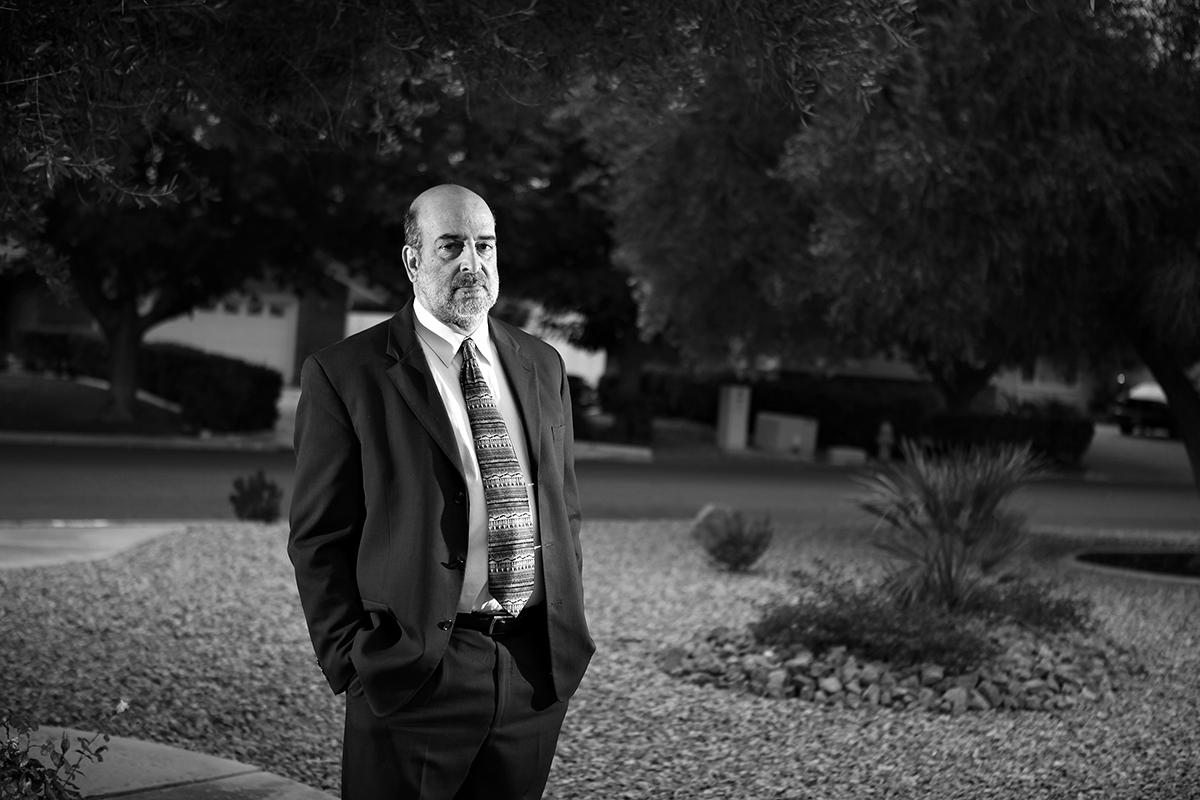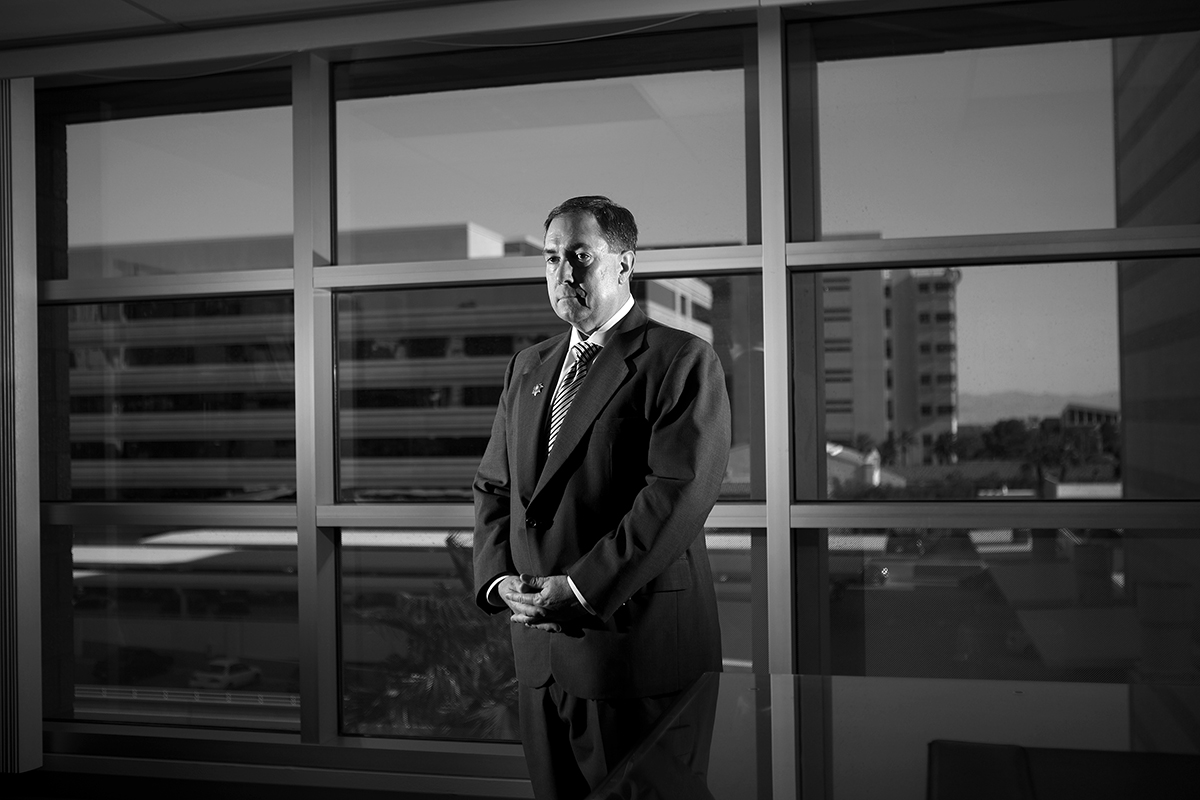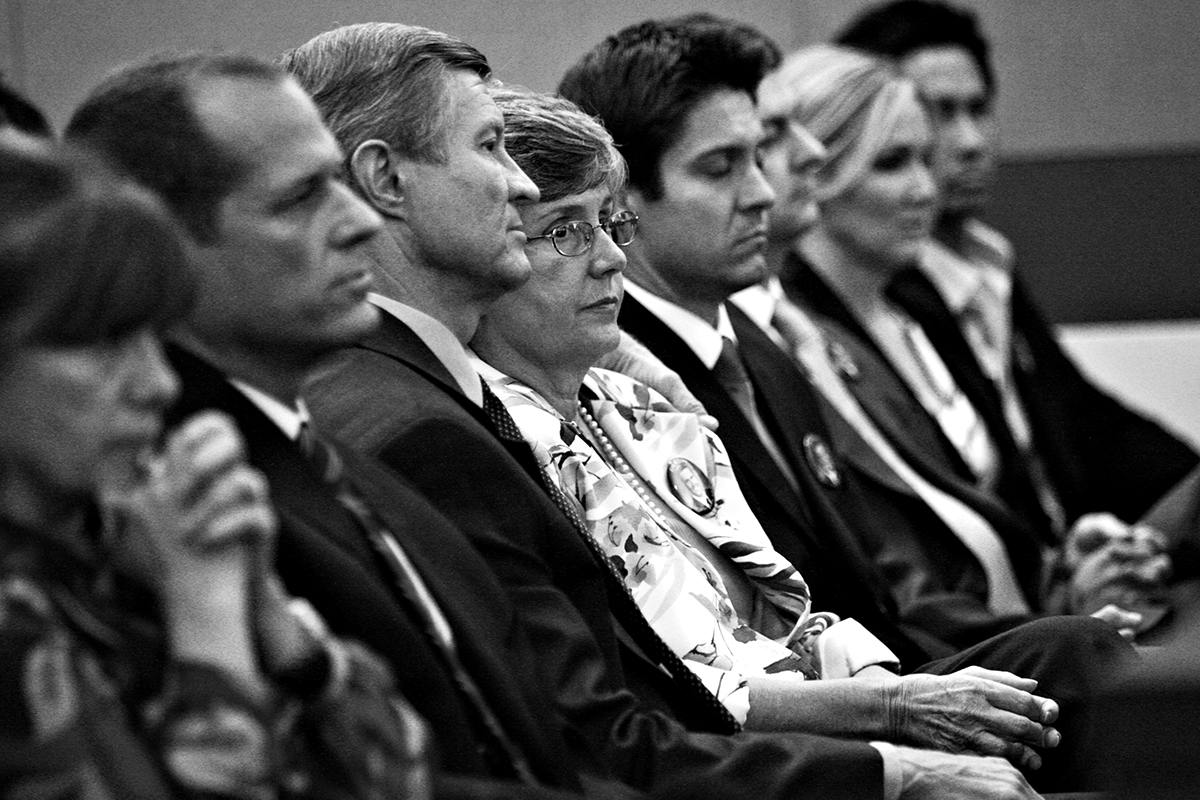Inquests undercut by prosecutorial inaction, deference to police
When a citizen in Clark County kills someone, prosecutors are there from the start of the investigation, often looking over the shoulder of detectives even before the body is moved. They'll follow the investigation, give advice and screen the case to determine what charges to file after an arrest.
But when a police officer kills someone, prosecutors are nowhere to be found. They just read the detective's report as they prepare for a coroner's inquest, at times using the information to put the actions of the police in the best possible light.
In a yearlong investigation of police shootings in Clark County, the Review-Journal found that Las Vegas police tend to shoot more often than their counterparts in comparable cities, ranking third in shootings per capita and per reported violent crime among 16 cities surveyed.
The newspaper also found striking differences in the way Clark County prosecutors handle deaths at the hands of police and how they deal with other homicides. Chief among them: The district attorney won't review an officer's use of deadly force unless the head of the police agency requests it.
David Roger, Clark County's district attorney since 2002, acknowledges that he doesn't treat officer-involved shootings like other homicides.
"We review it in preparation for the inquest," said Roger, who earlier this month announced that he will leave office in January. He has an informal job offer from the Las Vegas Police Protective Association, the Metropolitan Police Department's rank-and-file officers union.
"If something stands out in our mind that there's additional investigation that is necessary, we have the opportunity to either send out our own investigator or ask the homicide detectives to go back and investigate," Roger said. "Or if we believe that it's criminal, we can move a different direction and not proceed through an inquest."
At least that's the theory. It hasn't happened that way in more than 30 years.
The deference paid to police is even more dramatic in cases where an officer shoots but only wounds or misses entirely. In those incidents, the district attorney looks at the case only if the shooting subject is being prosecuted.
"The sheriff is an elected official," Roger said, addressing his relationship with Las Vegas police, the state's largest law enforcement agency. "He's elected by the community. They have expressed a certain amount of confidence in the sheriff, and he can handle those cases that do not involve death."
Relying on the police to police themselves is unusual. In many large cities prosecutors make that call, though charges are rare because officers are given wide latitude under the law.
While common practice for decades in Clark County, the prosecutor's hands-off policy is not widely known even among those who monitor the legal system.
"When I heard that I was really quite shocked," Allen Lichtenstein, general counsel for the American Civil Liberties Union of Nevada said of the Review-Journal's finding. "If the DA's office ... is not doing that for any homicide, be it police-involved or otherwise, then the DA's office is not doing its job. And that is a significant concern regardless of what happens to the inquest process."
Richard Boulware, a federal public defender and member of the executive board of the Las Vegas NAACP, last year was on a nine-member panel appointed by the Clark County Commission to recommend inquest reforms following two controversial shooting deaths. The committee, which included Roger and Clark County Sheriff Doug Gillespie, met four times for hours of briefings and debate before commissioners adopted its recommendations.
But Boulware said he was never told that Roger wasn't doing full reviews of killings by police. That knowledge likely would have changed the panel's recommendations, he said.
"I don't think anyone went out of their way to clarify that misunderstanding," Boulware said. "It's the district attorney's job to decide who's going to be prosecuted or not. It's not the job of the police department."
TWO-TRACK APPROACH
The case of Allen Duplan helps illustrate Clark County's dual-track approach to homicides.
Duplan, 20, was standing in his front yard in the 2900 block of Beacon Falls Way in February 2010 when gang members in a car stopped in front of his house. A passenger in the car pointed what was later found to be a pellet gun at Duplan, who had a real handgun of his own. He later told police he feared for his life when he fired several shots at the car.
One of those bullets hit a back-seat passenger, Jannet Sanchez, 17, in the face. She died two days later.
The district attorney's office has a team of prosecutors who specialize in homicide cases, and they often go to the crime scene. In this case, they skipped the scene but were informed of the shooting within a few days.
In any homicide investigation, detectives consult with prosecutors as needed. The deputy district attorneys probe the strength of the case, assess any holes that might complicate prosecution, and determine what laws were broken.
After completing their investigation, detectives can recommend charges or just submit the case to prosecutors and ask them to decide what, if any, criminal charges are warranted. Ultimately, only the district attorney can file charges or take the case to a grand jury and ask for an indictment.
In Duplan's case, police and prosecutors disagreed. Detectives arrested him and recommended a murder charge, but prosecutors declined, saying the gang members in the car were trying to start a fight and that Duplan legitimately acted in self-defense.
By contrast, when a Las Vegas officer takes a life, homicide detectives do the full investigation without a prosecutor involved. There's no consultation, back-and-forth discussion of holes in the case or assessment of potential charges.
In most cases, the detectives wrap up their work and send copies of the same report to the county coroner and to the district attorney's office. Prosecutors don't screen the case with an eye for any criminal charges. They simply assume that if police thought the officer had committed a crime, they would say so.
But if detectives do have concerns about the actions of a fellow officer, they don't tell the prosecutor. They bump it up the chain of command.
At the Metropolitan Police Department, for example, only the sheriff has the authority to send the case to the district attorney for criminal review. Gillespie did just that in 2010 when he determined that negligence by two officers in a chase had caused one death and several injuries, but the Review-Journal could find no instance of any sheriff forwarding an on-duty shooting case to prosecutors since 1990.
Prosecutors don't just shelve their copy of the police report. They use it as background to prepare for the coroner's inquest, where they're supposed to lay out the facts before a hearing master and seven citizen jurors.
Roger argues that preparing for the inquest is enough of a review. If his deputies saw something that indicated a crime by the officer, they would file charges, he said.
While that can happen, it hasn't since at least 1990.
Lichtenstein said the difference "suggests that for several generations of district attorneys, they were not doing their job of thoroughly investigating police-involved shootings, and that is something that the public should be up in arms about."
But not even key players in the system know how it actually works.
While several former detectives, prosecutors and Roger himself all described a process where police do not discuss the criminality of a shooting with the district attorney's office, Gillespie said they do.
"There are discussions between homicide FIT (Force Investigation Team) and the district attorney's office when officer-involved shootings occur and deadly force-type situations," Gillespie said. "And if the belief is that it's criminal, we discuss with the DA and charges are filed."
He added, "I feel comfortable in saying there has always been discussions between the DA's office and the investigators as to the particular case."
Police do meet with prosecutors after they receive the case file, but only to prepare for the inquest. Sometimes those meetings include the officers who are the subject of the inquest.
Regardless of their depth or purpose, the pre-inquest reviews were more than what Roger's office is now doing — nothing.
The district attorney's office has not reviewed a single police homicide in more than a year, even though Las Vegas police have shot and killed a record 11 people so far in 2011.
Roger said it's pointless for his office to accept cases for review because inquests were shelved last fall after police unions balked at inquest reforms, first by advising members not to testify at the hearings and then helping officers file a lawsuit challenging the new system's constitutionality.
Unless there's an inquest, there's no need for the district attorney to get involved, Roger said, because the sheriff or local police chiefs have already made a "preliminary determination that there is no criminal conduct."
Besides, he said, it's better to wait until after an inquest to look into charges for officers.
"I just don't think it would be wise to review part of a case," Roger said. "I just don't think it's a good use of resources, nor is it prudent to review those matters ahead of time."
Lichtenstein called Roger's approach a "dereliction of responsibility."
DECK STACKED IN FAVOR OF POLICE
In theory, a coroner's inquest involves citizens who consider all the facts surrounding a death presented by a "neutral arbiter of the facts," and then render an unbiased opinion.
In reality, the deck is stacked in favor of police well before the case gets to the jurors. That's because the "neutral arbiter of the facts" is the deputy district attorney who already believes that no crime has been committed.
In a comparison of inquest transcripts, evidence files and police reports dating to 1990, the Review-Journal found that prosecutors commonly act more like defense attorneys, shaping inquest presentations to cast officers in the most positive light.
Take, for example, the October 2004 shooting of Antonio Corona-Mendoza by North Las Vegas police officer Michael Carmody.
In a post-incident interview, detectives asked Carmody whether he identified himself as a cop or saw Corona-Mendoza with a gun before he shot the man. Carmody told them he couldn't remember announcing himself, and never saw a gun. Physical evidence also contradicted Carmody's version of events.
At inquest, Deputy District Attorney Jim Miller asked Carmody to recount the incident.
Under oath, the officer said he was sent to a late-night call about shots fired in an apartment. He said he was 90 feet from the apartment building, under a light pole, when he saw Corona-Mendoza outside the apartment and called to him to "come here." He said he saw the man look at him and heard him yell back into the apartment, then saw him disappear from view behind a vehicle, heard a shot, and then saw the man walk back into view.
Carmody then killed him with two blasts from a shotgun.
Miller, who would have read the detective's report to prepare for the inquest, never asked Carmody about his earlier statements. Nor did he address the contradictory evidence. After hearing Carmody's account, he only said, "I don't have any further questions, judge."
Astute jurors had some. They didn't know about Carmody's initial statement, but they asked whether the officer identified himself. Carmody said Corona-Mendoza could see his uniform, and that was enough.
They also asked about the contradictory evidence. Corona-Mendoza did have a gun when he died: a six-shot revolver. Witnesses testified that he had fired two shots into the apartment ceiling, which prompted the 911 call.
Carmody had testified that he heard a gunshot when Corona-Mendoza disappeared behind the vehicle, which told him the man was armed.
That would mean three shots fired and three live rounds still in a fully loaded revolver.
But investigators found four live rounds in the gun.
When a confused juror asked Carmody about the discrepancy, the officer shared the confusion. Miller intervened, suggesting that one of the two bullets found in the ceiling could have come from the shot Carmody said he heard. The officer agreed it was possible, if the front door was open at the time.
Miller didn't say if the front door was actually open, or note that witnesses agreed that Corona-Mendoza fired twice at the ceiling before going outside.
Instead, he told jurors that forensics showed Corona-Mendoza pulled the trigger six times but four rounds didn't go off. That didn't clear up the discrepancy, but the vote was unanimous: justified.
In a recent interview for this article, Miller said he did not see anything wrong with his handling of the inquest.
Carmody has been involved in six shootings in his 19 years as a North Las Vegas cop. Corona-Mendoza was his second fatality. In 1998 he killed Sergio Oliva, also with a shotgun, when the man drew a pistol as officers were responding to a "man with a gun" call. It was also ruled justified.
Other questions by prosecutors were simply leading.
In a 2009 inquest, Chief Deputy District Attorney Christopher Laurent took great pains to justify a jaywalking citation that escalated to a fatal shooting.
A North Las Vegas officer started the deadly chain of events by trying to ticket Tyrise Marquies Bell, 18, who ran from him. The officer chased and tackled Bell, who pulled a gun and was shot dead.
"What would happen if the word got out that North Las Vegas police officers are not fleet of foot and would not give foot pursuit?" Laurent asked.
"Everybody would run," the officer replied.
Those whose testimony could damage police don't get the same helpful prompts.
Prosecutors who handled the inquest into the 2010 death of 21-year-old Trevon Cole grilled his fiancée, Sequioa Pearce, the only civilian to survive the botched Las Vegas police drug raid on his apartment.
Laurent asked Pearce eight times about her decision to hire a lawyer, even though that's common for family of shooting subjects, and prosecutors seldom bring it up during an inquest.
And Laurent became incredulous when Pearce changed her story about seeing the shooting from the closet where she was hiding.
"Ma'am, in due respect, you would have to be crazy to make that kind of mistake," Laurent told her.
SHOOTINGS PROMPT OVERHAUL
The killing of Cole — a black, small-time marijuana dealer from a low-end neighborhood — was one of the two controversial shootings that prompted last year's overhaul of the inquest process.
The other involved Erik Scott, 38, an affluent, white salesman and graduate of the U.S. Military Academy at West Point who was shot and killed by three police officers at a Summerlin Costco store. Scott's killing received far more attention, in part because his media-savvy family and friends kept pressure on politicians to address long-simmering complaints about the inquest system and police shootings.
"Remember, this is nothing but theater," Bill Scott, a writer and former Air Force officer, said shortly before the inquest last year. "This is reality TV, and the sole purpose of this is not fact finding. It is to exonerate three cops who killed my son."
The jury's verdict was unanimous: justified. Scott declined comment for this article because his family's wrongful death lawsuit is pending.
While less of a public relations problem for Las Vegas police, Cole's shooting by Detective Bryan Yant a month before the Costco incident was more troubling — so much so that investigators questioned whether Yant's actions were so sloppy and reckless that they should also be deemed criminal.
Yant and his narcotics unit colleagues made numerous mistakes in the months, days and minutes before Cole's death. Yant had inflated Cole's criminal record in a search warrant affidavit, among other things.
And there were major inconsistencies between forensic evidence and Yant's account of the shooting. He told detectives that he kicked in the door to the apartment's darkened bathroom and saw Cole turn toward him and put his hands together like he was pointing a gun. He said he feared for his safety, so he shot Cole in the head.
But medical examiners called that sequence of events highly unlikely because of the way Cole fell after he was shot. Plus, Cole was unarmed, crouching in front of the toilet and flushing marijuana when Yant burst into the bathroom.
Some officers suspected that Yant accidentally pulled the trigger of his AR-15 rifle when he kicked in the bathroom door and didn't want to admit it. The shooting was Yant's third in 10 years, and his second fatal under unusual circumstances. Inconsistencies between forensic evidence and his version of events were also noted in 2001, when he shot and killed robbery suspect Richard Travis Brown. That shooting was also ruled justified.
The department's top brass took the highly unusual step of asking Roger himself to discuss the Cole case with them. Roger heard them out and decided he didn't believe Yant's story, also concluding the officer had fired accidentally.
In the end, it didn't matter much.
Because Roger believed the shooting was an accident, it satisfied the state's "excusable homicide" statute, making the death legal, Roger explained in a recent interview.
Even if he did believe Yant, Roger said, he still did not find anything about the shooting criminal.
That was the extent of it. The sheriff didn't formally submit the case to Roger for a criminal review. Instead, it went to Laurent and Assistant District Attorney Chris Owens to prepare for the inquest.
At the inquest, Owens questioned Yant more aggressively than any officer who has taken the stand for an inquest since at least 1990. He asked the detective several times if the shot was an accident.
Yant said no.
The death was unanimously ruled justified.
"We still believe that it was an accidental discharge," Roger said, "but we have to respect the jury's verdict."
That verdict, however, is entirely advisory. Nothing in the county ordinance requires the district attorney to do anything.
While the inquest system is often criticized as a rubber stamp for police, anger over the steady stream of "justified" verdicts might be misplaced. Police acting under the color of law are given considerable leeway both by law and by civilians who understand the job is difficult and cops are, after all, humans who make mistakes. Another overhaul or replacement of the inquest system won't necessarily result in prosecution of police officers.
Gillespie said he believes he is bound by the current process and can't do anything with this year's fatal shootings until courts decide if inquests can proceed. He said he is looking at alternatives to inquests that might include close involvement of the district attorney and citizens. The goal is finding something that creates public confidence.
"So when it's all said and done, people feel comfortable with the process," he said. "Not everyone will be comfortable with the outcomes, but comfortable with the process, that it was fair for both the officers as well as the community."
Clark County District Attorney David Roger acknowledges that he doesn't treat officer-involved shootings like other homicides. Earlier this month Roger announced that he will leave office in January. He has a job offer from the Las Vegas Police Protective Association, the Metropolitan Police Department's largest union.




















